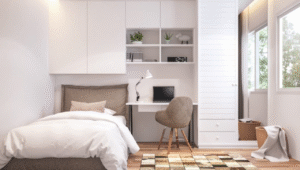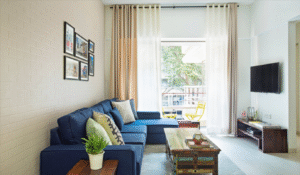Tips For A Healthier Bedroom
6 Tried and Tested Tips for a Healthier Bedroom and Better Sleep
Good-quality sleep is just as important to your health as nutrition and exercise, if not more so. In fact, it has been proven time and again that the health consequences of poor sleep are felt by the body immediately.
Inadequate or troubled sleep affects the body’s hormonal balance, which, in turn, affects metabolism and other bodily functions. Poor sleep can also weaken the immune system and impair cognitive functioning. It can cause unhealthy weight gain and increase disease risk as well.
If you haven’t been getting enough sleep and you’re ready to make a change, perhaps it’s time for you to implement the following tried-and-tested tips to create a healthier bedroom.
1. Make your bedroom conducive to sleep.
There are certain elements in your bedroom that can make it an ideal place to get a good night’s sleep. These include the noise level, lighting, temperature and the arrangement of furniture. To ensure your bedroom is conducive to sleep, take the following steps:
Minimize external noise
You can reduce the amount of external noise that reaches your bedroom by using thick, heavy curtains and soft surfaces such as thick rugs. You can also install a rubber door sweep that seals or plugs the gap between your door and the floor.
Adding plants to your bedroom can help reduce noise as the stems, leaves, branches, and wood in plants can absorb sound waves. Certain plants like the golden pothos, snake plant and spider lily also absorb toxins, so they help clean the air you breathe.
Turn off all the lights
Darkness or minimal lighting helps the body relax and prepares the body for sleep. If there’s an external light source interfering with your sleep, use blackout curtains that’ll keep your room in total darkness.
Maintain an optimum temperature
The external temperature in a bedroom can impact sleep more than noise. So, as much as possible, keep your bedroom temperature set to somewhere between 60 and 67 degrees Fahrenheit (or between 15 and 19 degrees Celsius). For babies and toddlers, between 65 and 70 degrees Fahrenheit (between 18 and 21 Celsius) is ideal.
2. Keep your bedroom clean.
Just as a clean household is essential to health, so is having a clean bedroom. To ensure you have a clean, clutter-free zone for relaxation and sleep, make sure you implement the following tips on a regular basis:
- Keep your space organized through weekly or monthly decluttering.
- Make your bed every day.
- Change your sheets and pillowcases weekly or at least twice a month.
- Don’t use rugs or carpets if you have allergies.
- Replace your pillows every 1-2 years.
- Keep all dirty clothes in a hamper.
- Avoid snacking or eating in your bedroom.
- Clean your bedroom daily or weekly.
3. Use a natural mattress.
If you want to sleep in a bed that’s clean, healthy and eco-friendly, opt for a high-quality natural latex mattress that’s naturally resistant to dust mites, mold and mildew. Organic latex mattresses like the ones we make at Nature’s Embrace are naturally antimicrobial, too. The materials we use are not only sustainably sourced but also do not contain any chemical additives.
The 100 per cent cotton material used in Nature’s Embrace latex mattresses is GOTS certified. Aside from this, our mattresses are also Eco-Institut and GOLS certified. We only use PureEmbrace Joma Wool® that’s certified by Oeko-tex, and adhesives certified by GREENGUARD Gold.
Having a healthy, natural mattress is not only great for sleep but also for reducing aches and pains that you may be waking up to every day.
You should also check your pillows to ensure that they provide optimum comfort and support while you sleep. There are now different types of pillows that serve the needs of people used to certain sleeping positions.
Again, consider getting pillows with organic or natural ingredients. This way, you can ensure you are not exposed to VOCs and other types of toxins that ordinary household products are known to give off, including pillows.
4. Avoid blue light exposure in the evening.
Getting plenty of light exposure in the daytime is fine, as it awakens your body and energizes you to get through the day.
However, bright nighttime lighting can interfere with the body’s circadian rhythm or internal biological clock.
Light exposure reduces the level of sleep hormones like melatonin, which you need to relax and fall asleep. Blue light, in particular, has the worst effect on sleep hormones, and it is emitted by electronic devices, such as laptops, computers, tablets and smartphones. So, avoid using these devices at least 1-2 hours before bedtime and keep them out of your bedroom.
5. Follow a consistent sleep-wake schedule.
If you don’t follow a regular sleep schedule, you might still suffer from poor sleep even if you’re getting the recommended 7-8 hours of sleep for adults. Conversely, following a consistent sleep and waking schedule can help improve sleep quality in the long term.
Certain studies have shown how an irregular sleep schedule can interfere with and alter the body’s circadian rhythm and melatonin levels. So, if you have trouble sleeping, strive to build a habit of sleeping and waking at regular intervals. Use an alarm clock for this purpose until it becomes ingrained in your circadian rhythm so it becomes a habit. By then, you won’t even need an alarm clock.
6. Learn to quiet your mind in the evening.
Adopt a pre-sleep routine that signals your body that you’re winding down for the day. Perhaps an hour or two before bedtime, you can indulge in a relaxing ritual that culminates in sleep:
- Take a warm, relaxing bath.
- Reflect on your day or meditate.
- Practice deep breathing and relaxation techniques.
- Read a book.
- Visualize pleasant things.
- Recite a mantra to close the day.
- Listen to soothing music.
Do whatever works for you to enhance your relaxation and sleep experience.
Get the best sleep now
Turning your bedroom into a relaxing haven for sleep is not a complicated process.
All you need to do is to follow the tips shared here and combine them with healthy sleep habits. This way, you can start reaping the benefits of good quality sleep and get healthier.







